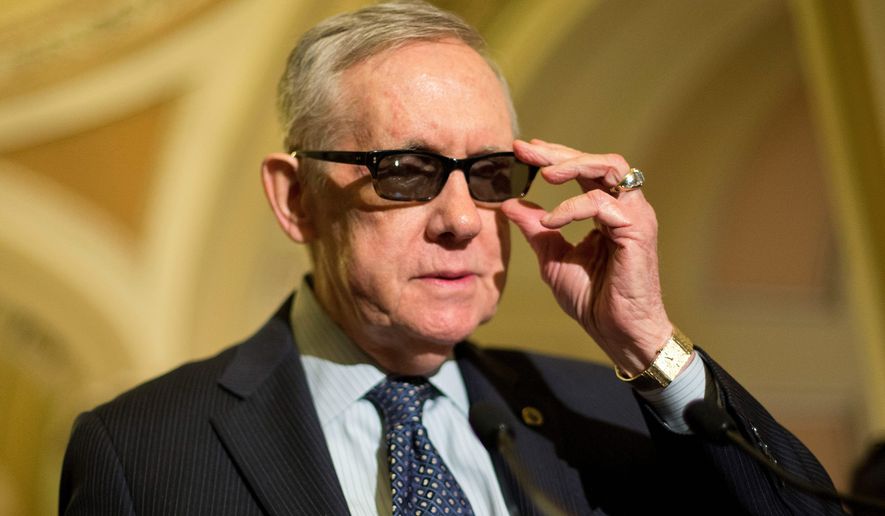An inspector general called them courageous, but Sen. Harry Reid said Friday that the government whistleblowers who accused him of using political pressure to try to win special treatment for a Las Vegas casino were “a bunch of whiners.”
Mr. Reid, a Nevada Democrat who announced he will retire at the end of this Congress after 30 years in the Senate, said it’s his job to press the federal government to speed up decisions on his constituents’ needs, and said that’s what he was doing when he made the appeal to U.S. Citizenship and Immigration Services to act on the casino’s request to expedite processing of investors’ visas.
“If I had to do over again, I would do it again. If I did it over again, I’d probably be stronger than I was,” he told KNPR radio in an interview just after he announced his impending retirement.
Homeland Security Inspector General John Roth earlier this week released a report accusing then-USCIS Director Alejandro Mayorkas of showing favoritism toward investor visa applications backed by high-profile Democrats in three different cases, including the casino request about which Mr. Reid personally got involved.
Mr. Roth said the special treatment was brought to his attention by more than 15 whistleblowers — an extraordinary number, in Mr. Roth’s judgment — who believed Mr. Mayorkas was caving to political pressure.
“That so many individuals were willing to step forward and tell us what happened is evidence of deep resentment about Mr. Mayorkas’ actions related to the [investor visa] program,” Mr. Roth said.
SEE ALSO: Obama-Reid team greatest ‘in the history of the country,’ says Harry Reid
The investigator called the whistleblowers “courageous” and vowed to protect them from retaliation.
But Mr. Reid saw the whistleblowers differently, accusing them of being envious of Mr. Mayorkas’s role in the decision-making.
“The homeland security report came from a bunch of whiners at the Department of Homeland Security who they felt I guess that they weren’t included in my conversation. Maybe I should have called them,” Mr. Reid said.
Stephen M. Kohn, executive director of the National Whistleblower Center, said Mr. Reid sent an unfortunate signal by attacking whistleblowers, who Mr. Kohn said serve an important watchdog role.
“Federal employees who raise concerns are not ’a bunch of whiners,’” Mr. Kohn said. “It is important that senators encourage employees to raise concerns regardless of whether or not they agree with them. Federal employees are already intimidated from reporting waste, fraud and abuse. It is inappropriate for members of Congress to throw gasoline on an already existing fire.”
The Obama administration has declined to punish Mr. Mayorkas after the report, with his boss, Homeland Security Secretary Jeh Johnson saying he gave his deputy a talking-to, but putting most of the blame on the EB-5 visa program itself.
SEE ALSO: Charles Schumer declares bid to replace Harry Reid
The inspector general, though, said Mr. Mayorkas generally stayed out of EB-5 decisions, which is why his intervention in three cases involving well-connected Democrats was striking, and rubbed the whistleblowers the wrong way.
In the Reid case, Mr. Roth said the senator personally spoke with Mr. Mayorkas on Jan. 8, 2013, and after the conversation the agency chief ordered career officers to speed up processing of visas for investors in the SLS Hotel and Casino, even though such requests for expedited processing are not usually granted and the staffers said there was no basis for it in the casino case.
Mr. Roth didn’t fault Mr. Reid, but rather Mr. Mayorkas, for caving to pressure from well-connected Democrats.
Mr. Mayorkas wrote a lengthy rebuttal of Mr. Roth’s charges, saying he felt his agency was mishandling the three applications and that he stepped in to try to fix a bungled process. In the Reid case, the agency chief said he learned of problems with the visa application from his own staff, and that Mr. Reid happened to raise the same issues at the same time.
“I was involved in the SLS case as needed to resolve the broader legal and policy issues that had arisen,” Mr. Mayorkas said, adding that once he’d solved those issues he ended his involvement.
The inspector general, however, said Mr. Mayorkas also agreed in his call with Mr. Reid that his agency would provide weekly briefings with Mr. Reid’s staff on the progress of the SLS case. Despite the expedited consideration, the agency wasn’t able to approve the visas in time for the casino’s self-imposed deadline.
Mr. Mayorkas has since been promoted to be deputy secretary at the Homeland Security Department, thanks in large part to Mr. Reid, who pushed the nomination through with the help of the so-called “nuclear option” that changed the Senate rules by shortcut and curtailed the ability of Republicans to filibuster President Obama’s nominees.
Mr. Mayorkas would likely have been blocked had the old filibuster rules been in place.
• Stephen Dinan can be reached at sdinan@washingtontimes.com.
• David Sherfinski can be reached at dsherfinski@washingtontimes.com.




Please read our comment policy before commenting.